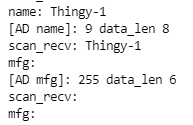Hello,
the device name is being parsed ok, but the mfg data in scan response seems to be there but not sure how to print it out.
Using ncs bt sample direction_finding_connectionless_rx modified for nRF52840DK since it was using bt_le_scan_recv_info and bt_data_parse.
The nrf terminal is showing the name for Thingy-1, but not the output for mfg of data_len 6 during case BT_DATA_MANUFACTURER_DATA.

/*
* Copyright (c) 2021 Nordic Semiconductor ASA
*
* SPDX-License-Identifier: LicenseRef-Nordic-5-Clause
*/
#include <stddef.h>
#include <errno.h>
#include <zephyr.h>
#include <bluetooth/bluetooth.h>
#define DEVICE_NAME CONFIG_BT_DEVICE_NAME
#define DEVICE_NAME_LEN (sizeof(DEVICE_NAME) - 1)
#define PEER_NAME_LEN_MAX 30
/* BT Core 5.3 specification allows controller to wait 6 periodic advertising events for
* synchronization establishment, hence timeout must be longer than that.
*/
#define SYNC_CREATE_TIMEOUT_INTERVAL_NUM 7
/* Maximum length of advertising data represented in hexadecimal format */
#define ADV_DATA_HEX_STR_LEN_MAX (BT_GAP_ADV_MAX_EXT_ADV_DATA_LEN * 2 + 1)
static volatile bool per_adv_found;
static bool scan_enabled;
static bool data_cb(struct bt_data *data, void *user_data)
{
char *name = user_data;
uint8_t len;
switch (data->type) {
case BT_DATA_NAME_SHORTENED:
case BT_DATA_NAME_COMPLETE:
len = MIN(data->data_len, PEER_NAME_LEN_MAX - 1);
memcpy(name, data->data, len);
printk("name: %s\n", name);
printk("[AD name]: %u data_len %u\n", data->type, data->data_len);
name[len] = '\0';
return false;
case BT_DATA_MANUFACTURER_DATA:
printk("mfg: %s\n", name);
printk("[AD mfg]: %u data_len %u\n", data->type, data->data_len);
return false;
default:
return true;
}
}
static void scan_recv(const struct bt_le_scan_recv_info *info,
struct net_buf_simple *buf)
{
char le_addr[BT_ADDR_LE_STR_LEN];
char name[PEER_NAME_LEN_MAX];
(void)memset(name, 0, sizeof(name));
bt_data_parse(buf, data_cb, name);
bt_addr_le_to_str(info->addr, le_addr, sizeof(le_addr));
// printk("[DEVICE]: %s, AD evt type %u, Tx Pwr: %i, RSSI %i %s C:%u S:%u "
// "D:%u SR:%u SID: %u\n",
// le_addr, info->adv_type, info->tx_power, info->rssi, name,
// (info->adv_props & BT_GAP_ADV_PROP_CONNECTABLE) != 0,
// (info->adv_props & BT_GAP_ADV_PROP_SCANNABLE) != 0,
// (info->adv_props & BT_GAP_ADV_PROP_DIRECTED) != 0,
// (info->adv_props & BT_GAP_ADV_PROP_SCAN_RESPONSE) != 0,
// info->sid);
printk("scan_recv: %s\n", name);
}
static struct bt_le_scan_cb scan_callbacks = {
.recv = scan_recv,
};
static int scan_init(void)
{
printk("Scan callbacks register...");
bt_le_scan_cb_register(&scan_callbacks);
printk("success.\n");
return 0;
}
static int scan_enable(void)
{
struct bt_le_scan_param param = {
.type = BT_LE_SCAN_TYPE_ACTIVE,
.options = BT_LE_SCAN_OPT_FILTER_DUPLICATE,
.interval = BT_GAP_SCAN_FAST_INTERVAL,
.window = BT_GAP_SCAN_FAST_WINDOW,
.timeout = 0U,
};
int err;
if (!scan_enabled) {
printk("Start scanning...");
err = bt_le_scan_start(¶m, NULL);
if (err) {
printk("failed (err %d)\n", err);
return err;
}
printk("success\n");
scan_enabled = true;
}
return 0;
}
void main(void)
{
int err;
printk("Starting Connectionless Locator Demo\n");
printk("Bluetooth initialization...");
err = bt_enable(NULL);
if (err) {
printk("failed (err %d)\n", err);
}
printk("success\n");
scan_init();
scan_enabled = false;
while (true) {
per_adv_found = false;
scan_enable();
}
}
How best to get mfg data in scan response?
(based on case, https://devzone.nordicsemi.com/f/nordic-q-a/84753/scan-and-parse-manufacturer-specific-data-zephyr/353172#353172)
thank-you,


